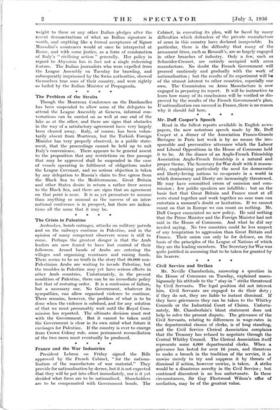Civil Service and Strikes Mr. Neville Chamberlain, answering a question
in the House of Commons on Tuesday, explained unam- biguously his attitude to the " stay-in " strike threatened by Civil Servants. The legal position did not interest him. Civil Servants are engaged to do their duty ; if they do not, they are liable to instant dismissal. If they have grievances they can be taken to the Whitley Councils or the Industrial Court of Claims. Unfortu- nately, Mr. Chamberlain's blunt statement does not help to solve the present dispute. The grievance of the Civil Servants, relating to differences in wage-rates in the departmental classes of clerks, is of long standing, and the Civil Service Clerical Association complains that the Treasury has refused to negotiate through the Central Whitley Council. The Clerical Association itself represents some 4,000 departmental clerks. When a grievance has lasted for over 16 years, and threatens to make a breach in the tradition of the service, it is unwise merely to try and suppress it by threats of dismissal if action, however unwise, is taken. A strike would be a disastrous novelty in the Civil Service ; but continued discontent is no less unfortunate. In these circumstances, Sir Guy Fleetwood Wilson's offer of mediation, may be of the greatest value.














































 Previous page
Previous page